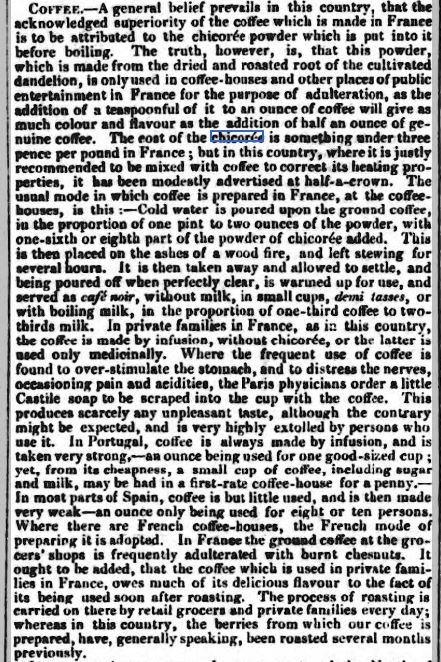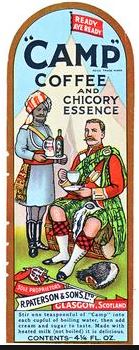Ever wondered how an old timey cup of coffee tasted?
What was it really like to take that first sip, on a day some hundreds of years before intensive farming methods, fancy new coffee plant varieties, modern methods of drying, roasting, grinding and so on? Well, wonder no more. Was it wonderful, like nothing you’ve ever tasted? Yes and no, The ‘no’ was that it mostly wasn’t wonderful and the yes — it was like nothing else, but it must have tasted irredeemably foul.
It wasn’t the fault of the beans though. In the early nineteenth century it was consumerism. The new middle classes took to the rich taste of coffee favoured by richer folks the century before. They liked convenience and so bought ready ground coffee, not beans. As it was said at the time, those who sold ground coffee recognised that “no article presents greater facilitation for adulteration than coffee”. And adulterate they did. About 36,000 lbs of genuine coffee was imported into the UK each year but it was boosted by 18,000 lbs of something else.
Adding roasted chicory was the most common of harmless extenders in coffee. That started out as a tax avoidance scheme. The UK government had thought that taxing imports of coffee was a nice little earner. But then the pesky Dutch and later the French took up the habit of adding roasted chicory to their coffee at the very start of the 19th century because, unaccountably, they liked the taste. Britain took up the fashion. His Majesty’s government plugged the potential revenue loophole and slapped a tax on imported chicory too.
Then came what economists nowadays call incentivised import substitution. Farmers in Yorkshire and East Anglia particularly found that they could grow chicory at home. And of course domestic chicory could not be taxed like imports. ‘Aha’ thought the legislators, to get around this we’ll make it an offence for anyone who has anything to do with coffee to have roasted chicory on the premises. So an Act of Parliament in 1822 – An Act to regulate the Manufacture and Sale of Scorched or roasted Corn, Beans, Peas, Beans or Parsnips – included a £100 fine for anyone using any vegetable substance “prepared or manufactured in imitation of or in any respect to resemble coffee or cocoa”.
And many did get caught — and fined the huge amount of £100, which in those days was enough to bankrupt a substantial business. Those critical of food adulteration were named and shamed. Take Mr Chaloner for example, who put burnt pea flour and sand in his coffee when he bothered at all, though 17 lbs of what he was selling as coffee had no coffee in it whatsoever.
Dare I go into what else got sold as coffee? Yes I will. Dried used coffee grounds were often added and, distasteful as the practice might have been, it was not so utterly disgusting as the other common adulterant.
Horses were as common as cars and trucks — in fact they were cars and trucks, or at least their engine. So just as today there are breakers who recycle old vehicles there were obviously knackers and horsemeat traders mopping up the dead and decrepit horseflesh.
But what to do with all those horse livers they ended up with? Some bright spark had the brainwave that if you slowly baked them until they were dry and crumbly you could add the powder to… yes, you’re ahead of me… coffee.

Though Starbucks and the rest have re-educated our tastebuds for ‘real’ coffee’, those cocktails of coffee and roasted roots still exist. There is a coffee and chicory brand called Camp Coffee which has been on sale in Britain since 1876. And there are other brands around Europe which use roasted barley, roasted dandelion root, roasted chickpeas as well. The Germans even have a word for these caffeine-free coffee substitutes, but someone should really tell them, as that word is ‘muckefuck’, which would make a practitioner in the art of caffeine-free coffee a muckefucker, I guess.

(The headline by the way is from 2 Kings v 38 — but you knew that already — and it’s one of those Old Testament recipe fails, only saved in the nick of time by part-time fine dining chef and full-time prophet, Elisha).

It just so happens that, while reading this blog post, I have been drinking coffee mixed with “pseudo-coffee” (chicory and roasted barley), because I like the taste. 🙂
Thanks very much for writing this post. Useful information.